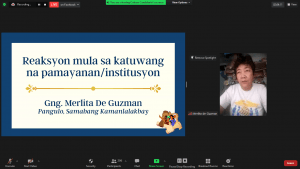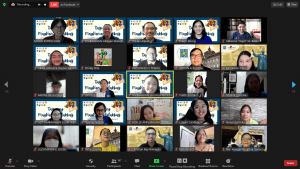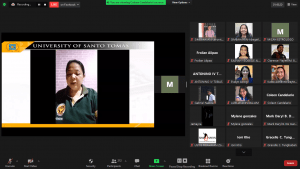The UST SIMBAHAYAN Community Development Office, in cooperation with other offices organized a virtual forum to present the results of Kamanlalakbay 18 Proceedings and discourse the challenges of implementing community development and advocacy amidst the pandemic.



The “Tayo ang MagKamanlalakbay: Action Research Part I” was recently held via Zoom and Facebook Livestream.
Event partners were the Faculty of Arts and Letters Department of Sociology, Samahang Kamanlalakbay (SK), and the UST Sociological Society (USTSS). The event was part of the celebration of the 125th Anniversary of the Faculty of Arts and Letters.
Faculty of Arts and Letters Dean Prof. Marilu R. Madrunio, Ph.D., in her opening remarks, highlighted that at this time of pandemic, the academic discourse is centered on action research, an instrumental research method that encouraged to view perspectives of different stakeholders on certain issues and to refine critical and progressive thinking.
Providing a historical glimpse of Kamanlalakbay, UST SIMBAHAYAN Director Asst. Prof. Froilan A. Alipao, shared that it was conceptualized in 2002 as the general assembly of the UST partner communities and institutions. From 2002 to 2005, selected and committed community and institution leaders participated in various capacity-building training. During Kamanlalakbay 3 in 2005, programs and projects were evaluated through a participatory approach.
Meanwhile, Kamanlalakbay 4 in 2006 paved the way for the establishment of Samahang Kamanlalakbay (SK) which continued in 2007, when the SK members elected their officers and organized sectoral and geographical clusters.
In 2008, the National Service Training Program (NSTP) specifically the Civic Welfare Training Service (CWTS) and Literacy Training Service (LTS) were brought under the management of the Office for Community Development (former name of UST SIMBAHAYAN). It opened the opportunity to bridge and interweave the NSTP (CWTS/LTS) to the community development and advocacy projects.
Apart from the Kamanlalakbay, a series of training were conducted to improve the skills of community and institution leaders. These include the training for Bamban Ayta Tribal Association (BATA), community health seminars, and basic ecclesial communities which was supplemented with regular community visits.
Due to the community engagement efforts, the SK was legally recognized on March 3, 2011, by the Department of Labor and Employment (DOLE) as an association in the Philippines. Alipao emphasized that the journey of Kamanlalakbay for almost two decades has shown the praxis of see-judge-act-reflect in solidarity with the synod of the Church, nation, and environment.
Presented to the participants were the scope and limitation as well as the research method delivered by UST SIMBAHAYAN Program Development Officer Ms. Veronica Michelle Moreno. This was followed by the sharing of Kamanlalakbay 18 Pagsubaybay at Pagtatasa 2019-2020 at 2020-2021 by Ms. Christine Ladera of the Parent Advocates for Visually Impaired Children (PAVIC) and BA Sociology students Ms. Micah Estrologo and Ms. Angel Aranton. Afterward, the Kamanlalakbay 18 Pagpaplano 2021-2022 was discussed by Sister Shirley Milla, RMI of the Holy Family Social and Education Center-RMI, and BA Sociology students Mr. Gabriel Naboa, Mr. Sealtiel Dequiña, and Ms. Theara Ablola.
Kamanlalakbay 18 Community Participation Matrix 2019-2021 was presented by Mrs. Vicenta Sochaco of Brgy. Sibulan, Nagcarlan. Laguna with Naboa, Dequiña, and Ablola. Lastly, Kamanlalakbay 18 Pagtatasa at Rekomendasyon was given by Estrologo, Aranton, and Ablola.
Based on the presentations, USTSS Treasurer Ms. Ioni Kho, SK President Ms. Merlita B. De Guzman, and College of Architecture Community Development Coordinator Asst. Prof. Antonino IV N. Tobias, shared their insights.
Department of Sociology Coordinator Prof. Clarence M. Batan, Ph.D., in his closing message, expressed that the composed discourse portrayed in the event is a genuine concept of citizenship and should be embodied as well in the government. A consultative discussion for community development with no personal agenda, but rather the intersection of self with the social phenomenon, should prevail.
UST SIMBAHAYAN Asst. Director Asst. Prof. Evalyn B. Abiog, Ph.D., in her closing remarks highlighted the significance of analysis and evaluation as the basis of planning, implementation, and monitoring of community development and advocacy projects. Despite the challenges brought by the pandemic, the community engagements continue to thrive through open communication and strong partnership with different stakeholders, said Abiog.




